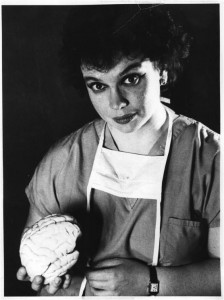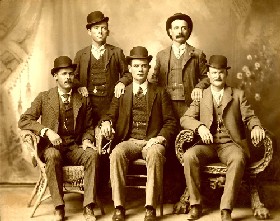I remember traveling the U.S. looking for a residency — back then it was in neurological surgery. My mother made me a detailed itinerary in a notebook which I clasped in my purse. Cheap motels awaited me in university cities when I arrived for my interviews. I mean, I never would have gone to all that trouble if I knew I was going to change specialties before long.
 Still, my enthusiasm carried me through a route with too many time zone changes. But I was young, single minded, rendered joyous and enthusiastic by my love of the brain.
Still, my enthusiasm carried me through a route with too many time zone changes. But I was young, single minded, rendered joyous and enthusiastic by my love of the brain.
I had a horror, as some of this was done in snowy regions at snowy times, of having to sleep in an airport. I am delighted to report that I never had to – unlike our most recent holiday season, when many people had to. Read more on Sleeping In The Airport…
Filed under Sleep by on Jan 21st, 2011. Comment. ![]()
Research is something that many people find suspicious. The mass public doesn’t know what makes “good” research and what is just plain manipulation.
Most people know that studying a lot of cases gives a more accurate picture than studying a single case – or just a few cases. But speaking as a formally trained and professional researcher, let me tell you that – contrary to conventional wisdom — it is really hard to make any sense of any kind of statistics that study a big-lot-much-HUGE number of human people.
Filed under politics, Research by on Jan 19th, 2011. Comment. ![]()
She was a young female staffer in her first professional position. What she may have lacked in experience, she made up for with a lot of heart and she extended her maximum effort for every single patient.
I had been like that in the beginning, too. At first, you have no body of knowledge to draw upon, but you quickly learn every time a new patient comes in. With experience, you see it becomes clear patients are more alike than different, and the work is at least a little less onerous.
But our newbie had a very few months experience with this intense clinical situation. So every single patient was new and scary, and she gave her all. One week before she had dealt with one of the most difficult situations.
Read more on The Operation Was A Success, But The Patient Died…
Filed under End Of Life by on Jan 18th, 2011. Comment. ![]()
Sometimes my mother would act strangely.
I remember when she told me that she remembered when my tiny behind could fit entirely into her hand, and that for that reason she did not have to listen to anything I said. I did not follow the logic, but since I certainly could not remember when my behind was that small, she had me.
It seems that wherever I go, whatever clinical situation I have found myself in, my female colleagues on the staff eventually start talking about mothers and daughters.
The following statistic is not from valid research mind you – just from casual observation – but every mother wants to have a daughter just like her.This does not happen, as I patiently explained to my mother, because of the DNA getting all jumbled up through something called genetic recombination. I would probably have a daughter who was as charming as Great Aunt Gussie, the woman who had stolen the family inheritance and had not been known to be particularly polite in polite society either.
The fact that mothers and daughters are genetically different is only one reason moms just never get someone “just like” them. Mothers and daughters grow up in different eras. A woman of my mother’s era may feel that her professional options were limited — teacher or nurse, maybe, but these were generally some sort of “skill builders” until Mr. Right came along.
My mother told me that her mother wanted to do something vaguely medical, even had some kind of an interest in laboratory analysis. But she ended up being some kind of a religious philanthropist, starting Jewish institutions. Nice, but not hands-on caring for other people, if that is where your passion is.
There are other differences, in family and upbringing, that are too great to describe. Here is a superficial if not-otherwise bad article on this from our friends at Good Housekeeping and Web MD.
But wait, there’s more. Consider the 32-year-old woman with allegedly healthy five and seven year old children at home, who said she was wildly depressed because her mother did not visit, did not come around at all, and could not seem to have a good, happy relationship with her.
I asked her the obvious question. What kind of activities did she enjoy with her mother? I tried not to jump when I heard the response.
“Armed Robbery.” Read more on Family Bonding As Outlaws…
Filed under Family by on Jan 18th, 2011. Comment. ![]()
There are actually some people who are reporting original scientific research ideas that can help people, a lot – like this one.
 The idea here will be to harvest some sperm stem cells, and change them into insulin producing cells for people who have Type I diabetes (also known as Juvenile diabetes). These are the people who are born without the kind of cells that produce insulin, rather than those who develop diabetes later in life due to lifestyle issues like drinking, obesity and other factors.
The idea here will be to harvest some sperm stem cells, and change them into insulin producing cells for people who have Type I diabetes (also known as Juvenile diabetes). These are the people who are born without the kind of cells that produce insulin, rather than those who develop diabetes later in life due to lifestyle issues like drinking, obesity and other factors.
This can mean a better life, better quality of life, maybe just life, period, or at least life without a bunch of daily self administered syringes for a lot of people.
Read more on You Don’t Have To Kill Babies To Get Stem Cells…
Filed under Stem Cells by on Jan 14th, 2011. Comment. ![]()
I have grudgingly accepted that we live in an anti-intellectual society but I find it extremely difficult to take care of people who do not know if they are pregnant or not — and have no interest in pregnancy tests. You might ask what business is it of mine?
 It is my primary business – giving people prescription drugs or natural alternatives to same. If these people are women of child-bearing age, I have to know – and advise them – of potentials for birth defects, transmission of substances through nursing, and other eventualities.
It is my primary business – giving people prescription drugs or natural alternatives to same. If these people are women of child-bearing age, I have to know – and advise them – of potentials for birth defects, transmission of substances through nursing, and other eventualities.
So it is extremely important in my line of work to determine if a woman is pregnant, nursing or even just planning to have a baby. Read more on Children Having Children Is Not A Sustainable Model For Society…
Filed under Family by on Jan 13th, 2011. Comment. ![]()
Even I – a supposed expert — have only scraps of information on this drug.
I remember a wonderful professor in medical school, who introduced me to her mother, who had some problems with dementia. Mother had improved greatly, it seemed, in a loving homey institution on a medication called “Centrophenoxine” — which I have since learned is also called “meclophenoxate” or “Lucidryl.” Read more on Mostly Harmless “Smart Drug” — But No Endorsement (Yet)…
Filed under Alzheimer's Disease by on Jan 12th, 2011. Comment. ![]()
The idea of science attempting to study or explain the interaction between doctors and drug reps seems strange.
So I checked out the original article that had been reviewed as objective science. I put it all together. I decided that none of the studies that were slopped together to make this meta-study were going to impress me. I can’t remember seeing anything that looked scientific as I poked around. We are talking about “naturalistic” studies here. Doctors really don’t seem to want to believe that anyone can control their thinking. Some might get contrarian and avoid prescribing things that are too aggressively presented. Maybe others do succumb. The idea that the drug reps bring a lecturer and somehow useful information might be exchanged is idealistic at best. Let us switch from science to reality. I remember the muscled male French drug reps they sent to me in the hospital. I remember when the dean of the medical school married a gorgeous female drug rep — a sort of midlife-change direction marriage — leaving behind someone who had once been described to me as a barracuda like entity. Read more on Influence Of Drug Reps On Physician’s Prescribing Habits…
Filed under big pharma by on Jan 12th, 2011. Comment. ![]()
 It is horrible and terrible and should not have happened, but it did. We have to look at questions we have looked at before. We claim — all of us at one time or another — that human life is precious, and that its very existence is beyond price, and the quality of such existence is pristinely precious, and then everybody in America has to process this tragedy.
It is horrible and terrible and should not have happened, but it did. We have to look at questions we have looked at before. We claim — all of us at one time or another — that human life is precious, and that its very existence is beyond price, and the quality of such existence is pristinely precious, and then everybody in America has to process this tragedy.
First, let’s take care of the straight medical questions. Congresswoman Giffords is obviously getting the best possible care and the most modern possible care. People have learned a whole lot about injuries to the brain since yours truly hung out in a semi-rural University Medical Center in Northern France. (I cannot believe it was over two decades ago).
The people taking care of her have told USA Today the basics, so I can only recapitulate.The shot was made at point blank range, estimated by some as 3 or 4 feet. The bullet entered the back of her head on the left side, and exited through the front. It is true that the structures controlling heartbeat, breathing, and basic survival are more toward the middle of the brain, or “brain stem.” Things like using the senses to put together images of what a human is dealing with are a bit more superficial. Read more on Left, Right, Jewish, Christian — Arizona Shooting Victims Are More Than Political/Religious Pawns…
Filed under politics by on Jan 11th, 2011. Comment. ![]()
Am I a Brit-snob? Never thought I was, but maybe I am turning into one. Or maybe it is because The Daily Mail has more detail about the trial of Michael Jackson’s doctor — and better pictures. Whatever. The truth of the matter is that when the story about Michael Jackson’s death first came out, I had to look up the generic name of Propofol, because I have never used it. I mean, why would I be hanging around with general anesthesia? For that matter, why would a cardiologist be hanging around with general anesthesia?? Money alone? Possible, I do not know what this guy’s finances were like. But I have never personally known or heard of a starving cardiologist — although I suspect that those who do insurance only no co-pay may be closer to it than they want to admit. But I suspect this guy was not one of those. “Rescuer?” Perhaps. Although I cannot quite see Michael Jackson as a “victim” needing saving. Someone basking in the glare of celebrity? More likely. A rich person’s doctor, maybe — a doctor wanting to work with famous people. I have felt the pull of that one myself. But I ran like crazy when I figured out these folks are more interested in getting the prescriptions they want – usually recreationally — rather than in getting something that might actually help any actual medical problem they might have. “Celebrity” may be a new kind of pathology, where people imagine themselves as uber-people who have more rights than other people, and who can buy pretty much anything they want. Some doctors are easier to buy than others –otherwise how could tobacco companies present medical experts who say smoking won’t harm you? Who can put a price on credentials, or even signatures? I think this man sold it all. Sure, The Mail has verified — other stories, other places, too — that his purchase of large amounts of propofol was legal, and that his credentials were real. This is not substitute for “ethics,” which people often say they will teach in medical school, but which are, basically, impossible to teach. How can you teach something that life-experience will be the only thing to test you on? Ethics are learned young, far before medical school, and internalized. Read more on Celebrity Pathology Requires Ethics To Treat…
Filed under Celebrities, prescription drugs by on Jan 11th, 2011. Comment. ![]()


